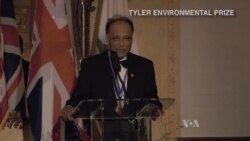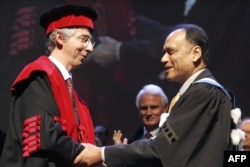Villagers and small farmers in the developing world have something to teach economists about sustainable growth, according to British economist Partha Dasgupta, who received this year's Tyler Environmental Prize.
Dasgupta was honored with the major environmental prize for his work in bridging the gap between economics and environmental studies.
Dasgupta, who was presented with the award at the University of Southern California, said his field of economics developed after the industrial revolution and has, until recently, lacked the tools to understand the complex natural world in which economic activity takes place.
"The whole of development economics," he said, "concerned as it is with the study of poverty and ways out of poverty in Africa, for example, and South Asia, literally did not have the language to pick up the fact that economic development has to be in harmony with what nature provides."
Dasgupta was honored for combining hard science with concerns for those now called the world's "bottom billion."
An emeritus professor at Cambridge University, Dasgupta has worked with scholars in the social and natural sciences to probe such issues as the role of poor nutrition in curbing productivity, biodiversity and sustainable growth, and the differing prospects of people born in the industrial and developing worlds.
He said some economists have moved beyond such basic measures as Gross Domestic Product — the index that tracks the flow of goods and services — to take account of literacy and life expectancy, but says that even modern indexes of human development pay little attention to the Earth's ecology.
Dasgupta was born in Dhaka, before the partition of India in what is now Bangladesh, and says subsistence farmers in many parts of the world face environmental threats without the buffer that prosperity provides.
"So none of what I have written on would be news to the illiterate farmer in Zambia," he said, "but I think he would like to say that he's happy that I have tried to understand his life."
Dasgupta was one of the organizers of a Vatican conference last year that laid the groundwork for Pope Francis' 2015 encyclical on the environment. In 2002, he was knighted by Britain's Queen Elizabeth.
He is the first economist in more than 40 years to win the Tyler prize, and he says people in his field can learn about sustainable economics by collaborating with environmental scientists, who see the toll taken on nature by economic activity in both the industrial and developing worlds.
"If environmental scientists have taught us anything," he said, "it's to keep on telling us of the fragility of Earth, even though it's robust in some ways, but if you push it far, she reacts."
He says the Earth is reacting, something subsistence farmers in many parts of the world know too well.










